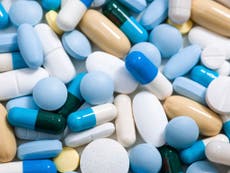We know exactly how to prevent HIV, yet people are still dying of Aids because of our privileged complacency
We’ve started to manage and reduce this country’s number of new HIV cases, but we can’t lose sight of the fact that there is still a global Aids crisis
I was diagnosed as HIV positive on 12 August 2015. It was a shock but probably not a surprise. After a seven-year relationship which ended in 2013 I was dealing with a lot of emotional trauma and I really struggled to find my feet as a single gay man in 2013. The landscape was so different from 2006. I found myself without the tools or experience to manage hook-up apps, chemsex (taking drugs to enhance sex) and single life in a “healthy” way.
I still consider myself lucky though – I was diagnosed in what I call “the year of no fear”.
Two main pieces of research that year made a huge difference in busting the stigma around HIV. The Partner study showed that condoms were no longer needed to prevent HIV transmission so long as the person living with HIV or had been in on treatment for six months and had an undetectable viral load. The Proud study showed that HIV-negative people taking daily pre-exposure prophylactic (Prep) medication were protected against HIV transmission if they were exposed to the virus.
These two discoveries mean that as an HIV-positive person, I can ensure I can’t pass on HIV to anyone else, and went some way to ending the residual paranoia lots of people felt around HIV after the shocking ways in which it was portrayed by the media in the 1980s and 90s.
After my diagnosis I publicly disclosed my status immediately because I felt empowered by the knowledge of scientific and medical advances. I knew there would be social hurdles, but nothing I didn’t think I could handle.
Since then, something extraordinary has started to happen. In England rates of HIV have started to drop significantly for the first time – since 2015 we’ve seen a drop of 28 per cent in new diagnoses. The decline has been driven by a 31 per cent drop in diagnoses among gay and bisexual men. In London, the reduction of new HIV diagnoses in gay and bisexual men is 44 per cent. The UK is now one of the first countries to meet the United Nations targets with 92 per cent of people living with HIV diagnosed, 98 per cent of us in treatment, and a further 97 per cent with an undetectable viral load, making them essentially uninfectious.
All of this has happened despite horrific cuts to sexual health services and local government budgets, but we cannot become complacent. If we don’t invest in our services, we run the risk of undoing all this great work. HIV and sexual health can’t be allowed to fall any further down the priority list.
After my diagnosis I co-founded iwantprepnow.co.uk, to ensure anyone who felt they might be exposed to HIV would be able to protect themselves. Now we’re calling on NHS England and local authorities to make Prep routinely available in England by April 2019. The unmet need is staggering – we estimate that approximately 10,000 people in the UK are still self-sourcing generic Prep online because they can’t access it via the NHS.
While prevention is a crucial part of lowering transmission rates, we also need to recognise the importance of early treatment. In 2014 San Francisco embarked on their Rapid initiative, which focussed on treatment at point of diagnosis, speeding up the process of beginning antiretroviral therapy which can lead them to an uninfectious zero viral load, and preventing people from falling out of the system.
In the UK the clinical benefits of earlier treatment were shown in an international study called Start. It is undoubtedly one of the most important HIV studies of the last decade. The results showed that early treatment led to fewer serious Aids-related illnesses, and that the benefits of treatment and prevention overlap. Other studies have proven that treatment dramatically reduces HIV transmission. Now people using treatment as prevention will know there are direct benefits for their own personal health as well as that of the community.
I have three young nephews and I would love to think that by the time they are in their twenties we will have managed to reduce our number of new HIV infections in the UK to such a low level that neither of them need ever worry about contracting HIV. It is for this future generation that we need to take responsibility and action now.
We’ve started to manage and reduce this country’s number of new HIV infections, but we can’t lose sight of the fact that there is still a global Aids crisis. In east and southern Africa there are almost 20 million people living with HIV, of which only 66 per cent of adults and 49 per cent of children are in treatment. In 2017 there were 800,000 new HIV infections and 380,000 Aids-related deaths – all of which is completely avoidable. Closer to home in eastern Europe we’ve seen the rate of new HIV diagnoses hit a record high this year.
Our friends before us did not die of Aids so that we could become complacent about HIV prevention – this can end with us. We have the tools to end HIV and Aids. We need to use them and not allow our privileges to diminish our responsibilities in this global healthcare issue.
HIV does not end when we end new HIV transmissions – those of us already living with HIV will do so for the rest of our lives. We need to end the stigma and take real action.
In a brave and admirable move, Labour MP Lloyd Russell-Moyle announced to the House of Commons this week that he is HIV positive. He was very clear in his closing words “I have a perfectly healthy life, so my announcement here today should go totally unnoticed.” He is absolutely right, but he made global headlines. We still have so far to go.
World Aids Day is a time to remember those who were not as lucky as me. We need to keep our history close, in our minds and in our hearts and allow our future to flourish in hope and defiance.
Greg Owen is the co-founder of iwantprepnow.co.uk




Join our commenting forum
Join thought-provoking conversations, follow other Independent readers and see their replies